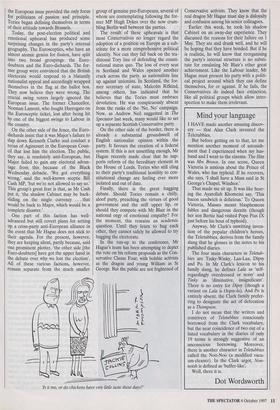Mind your language
I HAVE made another amazing discov- ery — that Alan Clark invented the Teletubbies.
But before getting on to that, let me mention another moment of astonish- ment that I experienced when my hus- band and I went to the cinema. The film was Mrs Brown. In one scene, Queen Victoria is anxious about the Prince of Wales, who has typhoid. If he recovers, she says, 'I shall have a Mass said in St George's Chapel, Windsor.'
That made me sit up. It was like hear- ing the Ayatollah Khomeini say, 'This bacon sandwich is delicious.' To Queen Victoria, Masses meant blasphemous fables and dangerous deceits (though her son Bertie had visited Pope Pius IX just before his bout of typhoid).
Anyway, Mr Clark's unwitting inven- tion of the popular children's heroes, the Teletubbies, derives from the family slang that he glosses in the notes to his published diaries.
The four main characters in Teletub- bies are Tinky-Winky, Laa-Laa, Dipsy and Po. In Mr Clark's lexicon to his family slang, he defines Lala as 'self- regardingly overdressed or noisy' and Tinky as 'diminutive, insignificant'. There is no entry for Dipsy (though a variant on Lala is Oopsy-la). And Po is entirely absent, the Clark family prefer- ring to designate the act of defecation as a Thompson.
I do not mean that the writers and contrivers of Teletubbies consciously borrowed from the Clark vocabulary, but the near coincidence of two out of a listed vocabulary in the diaries of only 19 terms is strongly suggestive of an unconscious borrowing. Moreover, there is another character in Teletubbies called the Noo-Noo (a modified vacu- um-cleaner). In the Clark argot, Non- noish is defined as 'buffer-like.
Well, there it is.
Dot Wordsworth










































































 Previous page
Previous page